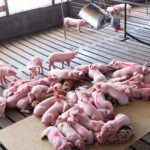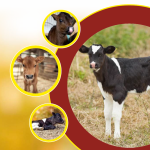-
-
+911204125943

Neonatal Calf Diarrhea

Neonatal Calf Diarrhea
Newborn calves are susceptible to neonatal calf diarrhoea (calf scours), particularly during the initial 30 days of their life. According to estimates, neonatal calf diarrhoea contributes 25-50% of calf mortality worldwide. Calves that survive will exhibit diminished performance for the remainder of their lives compared to healthy calves. Calf diarrhoea results in significant financial losses for cow-calf producers, surpassing any other health issue within their herds. It is estimated that a calf mortality rate of 20% can reduce the net profit of a farm by 40%. Neonatal calf mortality in India ranges from 12.5 to 30%. Neonatal calf mortality during the first month of life accounts for 80-85% of the total mortality, with a particularly high incidence in the third week of life.
Calf scour is not a distinct disease entity but rather a clinical manifestation associated with various infectious and non-infectious aetiologies, all characterised by severe diarrhoea.
Causes of Neonatal Calf Diarrhea
- Bacterial infections: E. Coli, Salmonella, Clostridium perfringens etc.
- Viral causes: Rotavirus, Coronavirus, BVD virus, IBR virus
- Protozoan parasites: Cryptosporidium, Coccidia
- Yeasts & Moulds
- Cleanliness & Sanitation
- Environmental Stress
- Insufficient feeding of colostrum
- Inadequate nutrition of pregnant dam
- Management flaws
Efficacy of Treatment in Neonatal Calf Diarrhea
✤Treatment of calves for scours is very similar regardless of cause
✤ Multi-pronged approach is followed for treatment due to lack of confirmatory diagnosis
✤ Anti-biotics, anti-coccidials, anti-spasmodics and rehydration therapy
✤ Despite giving all possible treatment, chances of recovery and survival. . . . . .??
✤ Mortality is high and the calves that survive don’t perform up to the expectation
Prevention is the first line of defense against scours: Back to the basics
- Environment and sanitation: Clean calving environment, Deep, dry, and clean bedding, Umbilical cord and navel disinfection, Dry environment until the umbilical cord atrophies, Prevent manure-contaminated colostrum, Adequate space per calf to minimize exposure, Stress-free environment.
- Nutrition: The ration of the pregnant female should be balanced in energy, protein, minerals and vitamins for maintenance and growth. Good colostrum feeding and a high plane of nutrition makes calf less susceptible. Supplementation with vitamin A early in life.
- Strengthen the digestive tract: The digestive system of neonatal calves is functionally mono-gastric, largely underdeveloped and very sensitive to external factors. This makes them highly prone to infections. It becomes important to support the digestive system of calves in early days of their life. Coupled with good managerial practices, a strong digestive system prepares them better to cope up with any scour challenge
For more information on the product “CALFWEL” and its application, please do not hesitate to contact us at info@essencenatura.com
-
Call anytime
+911204125943
-
Send email
info@essencenatura.com
-
Visit office
B-17, Devsha Business Park, D-215, Sector 63, Noida, Uttar Pradesh - 201301





